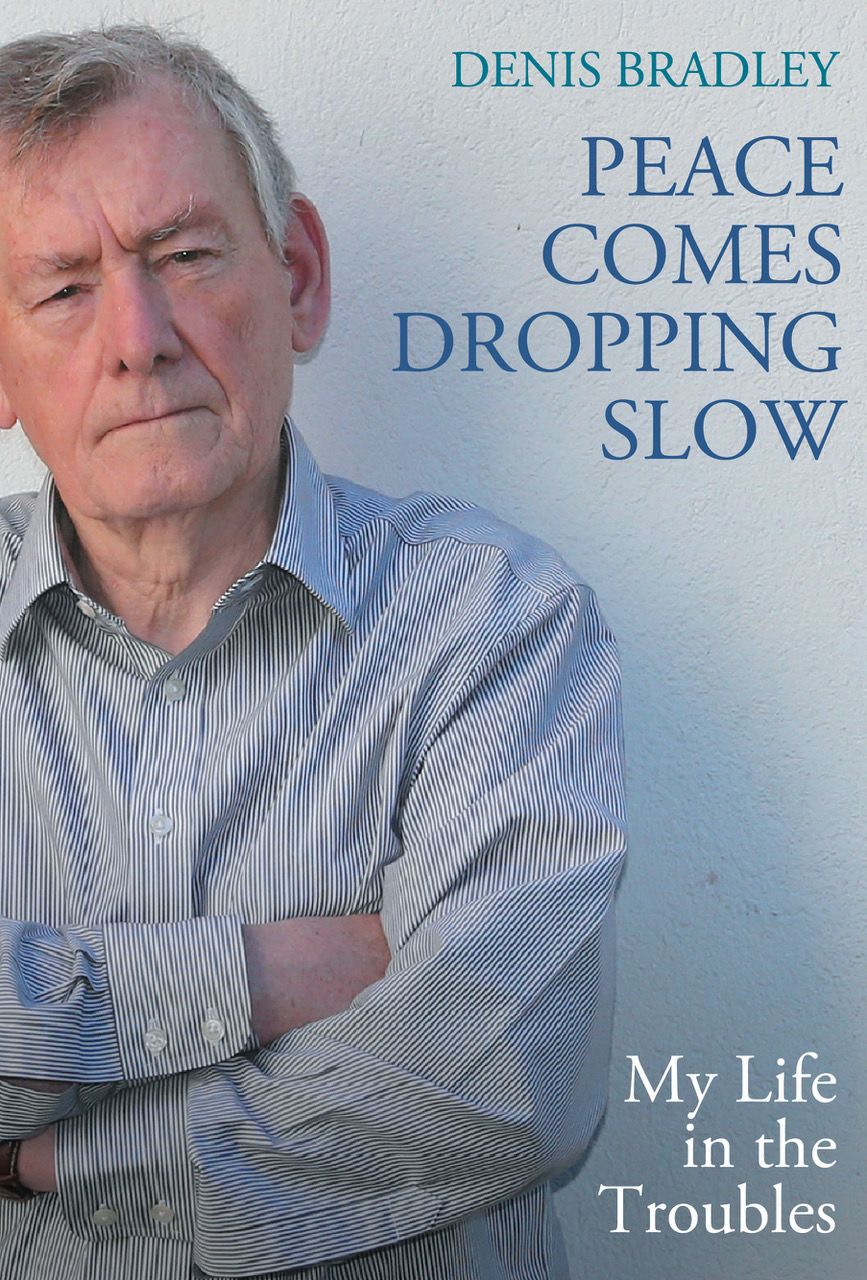An extract from PEACE COMES DROPPING SLOW – My Life In The Troubles by Denis Bradley
JOHN HUME HAD BEEN MY history teacher in St Columb’s College for two of the five years I was there from 1959 to 1964. In the first year his class was one of the few I looked forward to attending. There were two reasons for that. The first was that you knew that there was not going to be any corporal punishment – being slapped on the hands with a thick leather strap – as happened in those years. The second reason was that the three-quarter-hour lesson had a strong possibility of being interesting, particularly when Hume would challenge us to discuss and even debate for and against contentious issues, such as the case for nationalists to join the UUP to change its policies towards Catholics from within. The pros and cons of the European Union was another interesting subject for discussion and debate. Unfortunately, there was a set curriculum to be got through, mostly in English history, and we had exams at the end of the year, so not all classes were as stimulating as they might otherwise have been.

The discussions and the debates were much less frequent in the second year. Even as gauche teenagers we knew that there was a change, that our favourite teacher had not the same energy or interest as before. Some days you could see the tiredness in his face and if you didn’t notice it in the face, you were certain to observe and hear the yawns. The class came to know that he had become active in the Credit Union movement, and he may have travelled far down the country and back the night before to address some event. The more astute students knew that he was not going to stay much longer in teaching. But at least we got the best of him in that first year.
Hume’s house was not far from the cathedral, and in the short period that I was attached to that parish, he and I would have run into each other reasonably often. When I was sent to the Long Tower parish, I saw him less often. I hadn’t anticipated and was surprised that he was so antagonistic to the establishment of the Bogside Community Association, and I was a bit annoyed that he allowed or encouraged one of his chief henchmen to come to tell me that I would be irresponsible to establish the organisation. In my later dealings with him, however, I had almost forgotten the issue; we never discussed it and I am sure it was the last thing on Hume’s mind, especially considering how nervous he became around elections. I remember going into his office one day close to an election and him genuinely and nervously asking me how I thought he would do. This was at a time when Hume was attracting a vote that was out of sight of any of his opponents. That surprised me at the time, but the more contact I had with politicians, the more I realised the insecurity and vulnerability most of them felt.
It became a little heated and Hume, in disagreeing with something I said about the need to talk to republicans, called me ‘a Provo priest’ – it would have been known within the locality that McGuinness and I spoke reasonably often.
We had another small spat one night in a hotel in the late 1970s. I had become quite friendly with some SDLP councillors and officials. On this night I was with Billy McCartney, a local businessman, a long-time donor and member of the local party and a strong supporter of Hume’s. There had been the usual political discussion and argument over a few drinks, which continued into the foyer as McCartney, Hume and I were leaving. It became a little heated and Hume, in disagreeing with something I said about the need to talk to republicans, called me ‘a Provo priest’ – it would have been known within the locality that McGuinness and I spoke reasonably often. But I didn’t have to defend myself on that occasion because McCartney scolded Hume for the unfairness and the inaccuracy of his remark. Hume took the scolding very well.
I had played no part in organising the first meeting between Hume and the IRA, but I drove him part of the way to that meeting. This was during the time I had stopped going to meetings with Duddy and Gallagher but hadn’t lost contact with them. I was a bit surprised but delighted when Duddy told me that Hume was going to meet with the IRA and asked me to drive him across the border into Donegal. That was back in 1985, five or more years before more substantial meetings between Hume and republicans took place. It came about because of a remark Hume made on television that Sinn Féin were only surrogates for the IRA and that if he was going to talk to anyone it would only be to the people who gave the orders and not those who only took the orders. This led to the Army Council challenging Hume to meet with some of its members.
I don’t remember why it was necessary for me to drive Hume across the border only to meet up with Duddy, who then drove him to somewhere outside Letterkenny where he was transferred to a van and driven around for a few hours before alighting at a house where he was to meet and talk with three members of the IRA. I do remember coming back to Derry and visiting Hume’s wife, Pat. I called with her a few times over the next few days. It was easy to appreciate the bravery of Hume in allowing himself to be driven off into the unknown and to appreciate the worry and strain it put on Pat, who was sitting at home not knowing where he was, how he was and I am sure, in her worst moments, wondering if he would come back home alive.
Around the time of the negative response from the British government to the ceasefire offered by the IRA, followed by that fraught meeting with Adams, McGuinness and Doherty, we took the time to scrutinise the role of the backchannel.
He did. But only after a fruitless encounter. The IRA insisted that the discussions with him should be videoed. Hume, naturally and rightly, insisted that no such thing was going to happen. The stand-off was not resolved, and Hume arrived home. He had been away for three days. The raising and the dashing of hopes was becoming too commonplace.
Around the time of the negative response from the British government to the ceasefire offered by the IRA, followed by that fraught meeting with Adams, McGuinness and Doherty, we took the time to scrutinise the role of the backchannel. The three of us who had been involved took an afternoon to talk to each other about the future and our part in it.
It was becoming unhealthy to allow the two main combatants in the thirty-year conflict to attend to their own internal political issues without due regard to for resolution and for peace. John Major and his senior ministers turning their face against an opportunity to explore and facilitate dialogue rather than conflict was only the most recent example of this.
It was time to expose these realities and these questions to the light and to public scrutiny. That could not be done by any of the three people involved in the backchannel sitting around the table. It would need to be done by a major public figure. Hume was the obvious and correct person for the job. His standing in Ireland coupled with his reputation in America gave him the type of access and status that was needed. Inviting Hume to meet and briefing him fully on the level and length of contact between the British and the IRA would be the end of the backchannel. It had been built on confidentiality and trust, with both sides assured that the contact and the messages delivered between them would be outside of the public gaze. Revealing these to Hume, or to any politician other than one from Sinn Féin, would be seen as a breach of these conditions by the IRA, while disclosing to him that the IRA had offered a ceasefire, which had been rejected, would be regarded as a breach by the British government.
I remember Duddy warning that if we briefed Hume fully and if the knowledge that we shared with him led to a positive outcome of dialogue and negotiations between the British and the IRA, we should expect to be cast aside and ignored.
But the backchannel was in danger of becoming an obstacle to the goal it wished to achieve. It had been established to bring two sides into negotiation with each other and it now appeared to be allowing them both to luxuriate in having a secret liaison while maintaining an opposite public position. On the other hand there was the danger that, out of frustration and pique, we were destroying the line of communication when there were signs of engagement, despite recent disappointments.
I remember Duddy warning that if we briefed Hume fully and if the knowledge that we shared with him led to a positive outcome of dialogue and negotiations between the British and the IRA, we should expect to be cast aside and ignored. Politics was like that and the years of work that had been done to bring the British to the realisation that they had to talk to the IRA and the equal years spent providing the IRA with the means and the mechanism to engage with the British might receive a glancing nod but little more than that. I agreed that that was the likely outcome but that it should not stop us from doing the right thing.
PEACE COMES DROPPING SLOW - My Life In The Troubles by Denis Bradley is published by Merrion Press, available in bookshops and online, priced £14.25.





